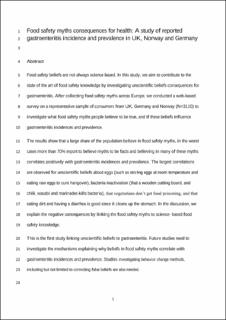| dc.description.abstract | Food safety beliefs are not always science based. In this study, we aim to contribute to the state of the art of food safety knowledge by investigating unscientific beliefs consequences for gastroenteritis. After collecting food safety myths across Europe, we conducted a web-based survey on a representative sample of consumers from UK, Germany and Norway (N = 3110) to investigate what food safety myths people believe to be true, and if these beliefs influence gastroenteritis incidences and prevalence. The results show that a large share of the population believe in food safety myths, in the worst cases more than 70% report to believe myths to be facts and believing in many of these myths correlates positively with gastroenteritis incidences and prevalence. The largest correlations are observed for unscientific beliefs about eggs (such as storing eggs at room temperature and eating raw eggs to cure hangover), bacteria inactivation (that a wooden cutting board, and chili, wasabi and marinades kills bacteria), that vegetarians don't get food poisoning, and that eating dirt and having a diarrhea is good since it cleans up the stomach. In the discussion, we explain the negative consequences by linking the food safety myths to science-based food safety knowledge. This is the first study linking unscientific beliefs to gastroenteritis. Future studies need to investigate the mechanisms explaining why beliefs in food safety myths correlate with gastroenteritis incidences and prevalence. Studies investigating behavior change methods, including but not limited to correcting false beliefs are also needed. | |
